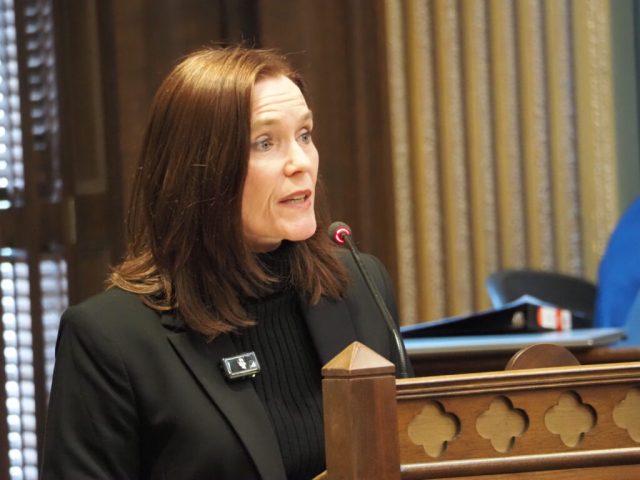
On Jan. 22, 2025, Senate Majority Leader Winnie Brinks (D-Grand Rapids) calls for support on a resolution allowing her to take legal action to compel the Michigan House of Representatives to send nine bills passed during the previous Legislature to the governor. | Kyle Davidson
With Republicans now controlling the Michigan House and Democrats still in charge of the Senate, many lawmakers opened this legislative session with talk of bipartisan solutions. However, tension between the chambers’ leaders has begun to boil over, as Senate Democrats on Wednesday approved a resolution prepping for legal action against the House.
“Michigan residents deserve elected officials who are committed to fulfilling their constitutional duties. Unfortunately, our Republican counterparts in the House of Representatives don’t seem to agree. They decided to start off this new legislative session with a blatant violation of our state constitution by blocking nine bills passed by both chambers from being presented to the governor,” Brinks said while speaking in support of the resolution.
The previous Democratic-led House melted down amid its final scheduled session days, failing to achieve the attendance needed to conduct business amid frustrations over road funding, water affordability, and impending changes to the tipped minimum wage and paid sick leave law. While the House’s adjournment marked the end of several Democratic policies, the Senate forged ahead holding a 29-hour long marathon session where it advanced several bills, including efforts on school safety and mental health support, maternal and infant health and an expansion of the state’s hate crime law.s
However, nine of those bills were never sent to Democratic Gov. Gretchen Whitmer’s desk while Democrats were in charge. Now new House Speaker Matt Hall (R-Richland Twp.) has, thus far, refused to submit the bills, while holding a legal review to determine whether they must be submitted, as well as the timeline to do so.
This includes legislation intended to bring additional funding support to museums owned by the city of Detroit, changes to the state’s wage garnishment and bankruptcy laws, an increase to the amount public employers must pay towards its employees’ health insurance and policies and extending eligibility for the State Police Retirement System to individuals in jobs related to law enforcement, including corrections officers and conservation officers.

Hall previously told reporters there is not a strict timeline for when the bills must be submitted to the governor. Brinks maintains that the House has a constitutional duty to send the bills to the governor, as Senate Democrats brought forth Senate Resolution 3, which would allow Brinks to take legal action on the Senate’s behalf to compel the House to submit the bills.
The resolution points to Article IV Section 33 of the Michigan Constitution, which states: “Every bill passed by the legislature shall be presented to the governor before it becomes law, and the governor shall have 14 days measured in hours and minutes from the time of presentation in which to consider it.” It does not mention a timeline for when bills must be sent to the governor, nor does it discuss procedure for submitting bills passed by the previous Legislature.
Senate Resolution 3 was approved by voice vote, with Republicans offering their opposition to the effort.
Sen. Jonathan Lindsey (R-Allen) slammed the House’s Democratic former leadership, while asking his colleagues to vote against the resolution, calling the proposal “ridiculous.”
“They couldn’t do something as simple as take bills that were passed and carry them to the governor to get her signature. And so now it’s the problem of the Republicans to try to solve this for the Democrats,” Lindsey said.
“I recommend that the Democrats — who do still have a majority here — instead focus their time on figuring out how to effectively legislate, and maybe think about the lessons that should have been learned from a session where Democrats literally failed the people of Michigan, couldn’t even conduct the basic duty of taking legislation that had been passed and delivering it to the governor for her signature,” he said.
Hall spokesperson Gideon D’Assandro did not respond to a request for comment prior to publication. A spokesperson for Whitmer also did not respond to a request for comment.
Brinks later told reporters she has yet to set a timetable for taking legal action, but said she would make the decisions when facts about Hall’s response become clearer.
“I’m not giving him a deadline, but at some point, there will be decisions made,” Brinks said.

GET THE MORNING HEADLINES.
